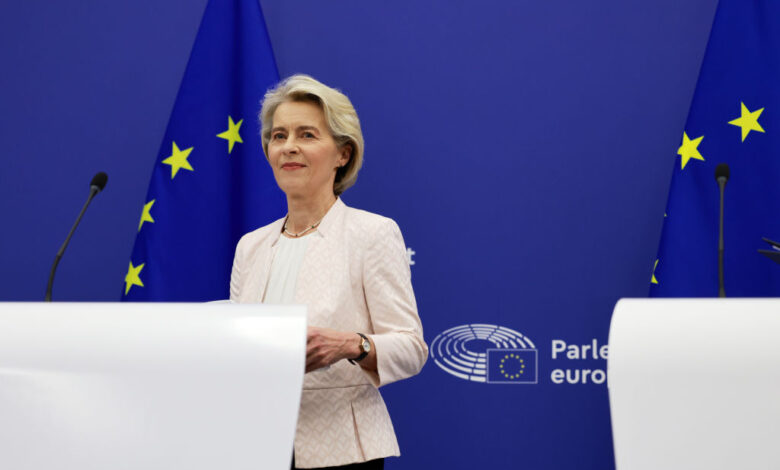The EU just re-elected its president for another five years — here’s what that means for tech

The European Union’s president, Ursula von der Leyen, was confirmed in the role for another five years Thursday after parliamentarians voted overwhelmingly to re-elect her.
The scale of her support (401 votes for versus 284 against with 15 abstentions) — a far firmer endorsement than last time around — may say more about lawmakers’ concerns over rising geopolitical uncertainties, with war still raging in Ukraine and the U.S. headed for an election in November that could return Donald Trump to the White House by 2025, than reflecting ardent passion for her leadership. But her ability to stay calm in times of crisis appears to have won her grudging respect at the least.
So what does a vote for continuity of the EU’s leadership mean for the bloc’s tech policy through to 2029?
Von der Leyen has already pressed ahead with major reforms in digital policy. Her first term saw the EU affirm the Digital Markets Act (DMA) and the Digital Services Act (DSA) — two landmark regulations that take aim at exploitative Big Tech business models and could force a major reset in platform operations.
The EU also passed legislative measures aimed at enabling more data access for businesses, researchers, the public sector and consumers. And tech policy was centerstage with her decision to prioritize a risk-based regulation for artificial intelligence at a time when many others thought it too early to intervene. Now, with generative AI accelerating concerns over the risks of deepfakes and other AI-driven harms, her decision to make sure the EU has a rulebook in place seems rather prescient.
Von der Leyen’s second term looks set to focus on deepening the impact of this earlier round of digital policymaking — with a clear pledge to “ramp up and intensify” enforcement of the DMA and DSA, per political guidelines she published to accompany her candidacy for a second term.
Enforcing the EU’s digital rulebook
Enforcement looks set to dial up, particularly in the area of e-commerce. Designated platforms subject to the Commission’s oversight here include AliExpress, Amazon, Booking, Google Shopping, Meta Marketplace, Shein, Temu and Zalando.
Some new tech policymaking may also be on the horizon with a possible (further) tightening of rules around children and young people’s use of social media. Von der Leyen has committed to an EU-wide inquiry on “the broader impacts of social media on well-being” during the second term.
There could also be a bigger clampdown on dark pattern design. “We will tackle unethical techniques used by online platforms by taking action on the addictive design of online services, such as infinite scroll, default auto play or constant push,” she writes. “We will also firmly combat the growing trend of abusive behaviour online with an action plan against cyberbullying.”
While additional legislative measures are possible, both these areas could be addressed by the Commission sharpening its enforcement of the DSA.
Another stated focus for a von der Leyen second term is on “protecting our democracy,” as she puts it — which means grappling with the ongoing challenge posed by online disinformation.
Again this might translate into stepping up enforcement of the DSA, which requires larger platforms to identify and mitigate systemic risks in this area. The EU already has strong powers to go after tech giants that don’t clean up their act.
Her manifesto also commits to addressing “the ever-more realistic deepfakes that have impacted elections across Europe” — with the EU president saying the Commission will ensure that transparency requirements in the shiny new EU AI Act are implemented. She also says the bloc will “strengthen” its approach to AI-produced content that risks misleading people. How exactly remains to be seen.
Growing AI and boosting competitiveness
In addition to doubling down on key planks laid down in her first term, there are also signs von der Leyen wants to refine her approach in some areas.
Boosting Europe’s competitiveness is a particular focus for the second term, including through an expanded focus on supporting homegrown AI innovations.
We’ve seen a taster of this already, with Commission plans to reconfigure the bloc’s network of supercomputers for AI model training. But more support measures are planned, including for AI startups and research — the latter via a new European AI Research Council.
Her manifesto also repeats a message of urgency around the need for the bloc to unlock greater data access to foster competitiveness and expand use of digital services.
Here she reiterates the role of data access in driving AI development and other “frontier technologies,” as she puts it — calling for a “data revolution” and committing to a “European Data Union Strategy” to simplify data access for businesses and others by establishing a “clear and coherent legal framework” for data sharing. Though her manifesto commits to maintaining the EU’s existing “high” standards of privacy and security. So there’s a clear balance required here.
Elsewhere in her manifesto, there’s a push for a new approach to competition policy to dial up innovation and competitiveness, including around M&A, which sounds intended to benefit startups versus incumbent giants — with von der Leyen writing that the bloc should be “more supportive of companies scaling up in global markets.”
Better support for firms who may be the target of killer acquisitions is also discussed. And she wants to see more progress on ironing out more of the wrinkles in the EU’s single-market concept — which can still resemble more of a patchwork quilt in the case of online services — again with the goal of helping homegrown startups to scale.
A von der Leyen-led second term Commission also looks set to expend effort on cutting red tape in a bid to promote business growth — responding to the perennial criticism that the EU’s love of rulemaking is a barrier to homegrown innovation.
For instance, her manifesto commits to proposing a “new EU wide legal status to help innovative companies grow” — which she says will “take the form of a so-called 28th regime to allow companies to benefit from a simpler, harmonised set of rules in certain areas.”
Who benefits and how exactly remains to be seen, but it suggests some form of general pan-EU regulatory sandbox idea to support startups, in addition to the AI-specific sandboxes the AI Act is already ushering in.
Biotech startups could also be set for a boost, as her next Commission will propose a new European Biotech Act in 2025 to make it easier for researchers and startups to commercialize lab and factory developments. “This will be part of a broader Strategy for European Life Sciences to look at how we can support our green and digital transitions and develop high-value technologies,” says von der Leyen.
Summing up her key elements of her policy approach in an executive note, she adds: “The world is in a race that will dictate who will be the first to climate neutrality and first to develop the technologies that will shape the global economy for decades to come. Europe cannot afford to fall behind and lose its competitive edge in this race, nor can it leave any strategic vulnerabilities exposed.”
Source link



